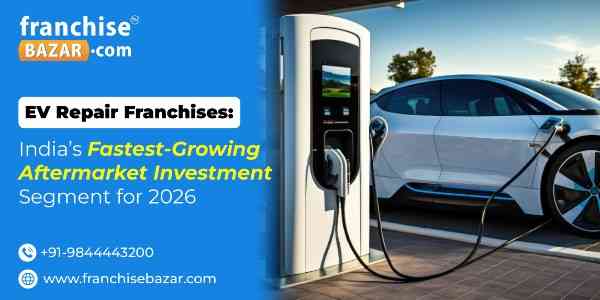EV Repair Franchises:Fastest-Growing Aftermarket Investment Segment for 2026

Written By: Bandana Gupta
India’s transition toward electric mobility is gaining remarkable momentum, and the true potential lies in EV charging aftermarket franchise rather than solely in vehicle sales. Supported by favorable government initiatives and increasing adoption, this is an opportune time to invest in charging infrastructure. For investors, EV charging franchises provide an attractive entry point, characterised by low capital requirements, reliable operations, and steady aftermarket recurring revenue.
While charging infrastructure remains a dominant franchise avenue, with EV sales exploding, the specialised, independent aftermarket infrastructure to service them is just beginning to form.
This creates a prime opportunity for investors and entrepreneurs, particularly through franchise models that offer training, standardised equipment, and brand recognition.
The EV Aftermarket Franchise – A New Phase of Growth
The aftermarket refers to all the services that help maintain a vehicle after it has been sold.
For traditional petrol and diesel (ICE) vehicles, this includes repairs, servicing, spare parts, painting, lubricants, accessories, and skilled mechanics.
For electric vehicles (EVs), the aftermarket looks a bit different. It mainly involves battery care, charging stations, limited spare parts, and general workshop support.
At first, this may seem like a smaller market. Deloitte even predicts that after-sales revenue could fall by almost half by 2035, and companies like Tesla say their cars don’t need yearly maintenance. But every change brings new opportunities. This shift will take time, giving manufacturers and service providers the chance to prepare and grow with the EV industry.
Key Drivers of EV Aftermarket Franchise Growth
1. Retrofit Kits
Retrofit kits will play a major role in the EV aftermarket. These kits replace old fuel engines with electric systems and must be approved by authorities like ARAI. The RTO should also check the kit’s authenticity during registration. Since these kits are made by independent manufacturers, not by EV brands, aftermarket dealers and workshops will handle installation and service. Retrofit kits cost much less than new vehicles, making them a popular choice for owners who want to keep their cars but switch to electric.
2. EV Repair Jobs
EVs are simpler to repair than fuel vehicles because they have fewer moving parts and no engines or gearboxes. The main components are the motor, charger, controller, and battery. Repairs in the early years are minimal, but costs can rise later due to expensive parts like batteries and motors. Labour charges may also stay high for now because skilled EV technicians are still limited.
3. EV-Specific Workshops
Currently, most workshops cater to fuel vehicles or serve only one EV brand. However, as demand grows, more multi-brand EV workshops will emerge, offering repair and service for all types of EVs, including two-wheelers, three-wheelers, and cars.
4. Skilled EV Manpower
EV repairs may seem easier, but they require proper technical knowledge and training. Even small mistakes can be costly. Many institutes are now offering EV repair and maintenance courses at different levels, helping to build a skilled and certified workforce for the future.
5. EV Charging Stations
Charging stations are essential once EVs are on the road. Vehicles need regular charging through public or private setups. Battery swapping stations are becoming popular because they allow quick battery replacement, similar to refuelling. Investing in charging or swapping infrastructure today can bring strong returns in the future.
Why EV Repair is a Top Aftermarket Franchise Opportunity
- Growing EV Numbers: India’s EV market is expanding fast, especially in two- and three-wheelers. As more EVs hit the road, the need for reliable repair and maintenance services will rise sharply.
- More Complex Technology: EVs run on advanced batteries, software, and electronics—very different from traditional engines. Most local mechanics aren’t trained for this, creating a big opening for skilled and specialised repair franchises.
- Warranty Safety: Many automakers only honour warranties if vehicles are serviced by certified centres. Authorised EV repair franchises give customers confidence that their vehicle warranties will stay valid.
- Smart and Connected Repairs: Today’s EVs rely on digital diagnostics and data. Repair franchises using AI and connected tools for quick, predictive maintenance will stand out from competitors.
- Rising Fleet Demand: Delivery and logistics companies are quickly switching to electric fleets. These vehicles need fast, dependable service, giving franchises a chance to secure steady, long-term business.
Key Franchise Opportunities in EV Repair for 2026
1. Multi-Brand EV Workshop Franchises
These centres provide repair and maintenance services for a wide range of electric vehicle models, enabling franchisees to serve diverse customer segments effectively.
Example: Pikpart Smart Garage offers multi-brand EV workshop franchises with comprehensive training, diagnostic tools, and operational support to establish certified service centres.
Investment & ROI
- Initial Investment: ₹3–15 lakh (covers diagnostic equipment, tools, and training)
- Payback Period: 18–36 months
2. EV Battery Repair & Refurbishment Franchises
Focusing on the most valuable and critical EV component, the battery, these franchises specialise in health diagnostics, repair, and refurbishment to extend battery life and reduce replacement costs.
Investment & ROI
- Initial Investment: Starting at ₹20 lakh (due to specialised equipment and regulatory compliance)
- Payback Period: Long-term growth opportunity; expected to become essential under future battery recycling and sustainability regulations
3. EV Technical Training Centre Franchises
These franchises address the acute shortage of skilled EV technicians by offering accredited training and certification programs for mechanics and service professionals.
Investment & ROI
- Initial Investment: ₹5–15 lakh (for training facilities, tools, and curriculum development)
- Payback Period: Medium-term returns through course fees, corporate training contracts, and industry partnerships
These franchise models offer structured entry into India’s rapidly expanding EV aftermarket, combining technical expertise, brand support, and scalable revenue streams aligned with national electrification goals.
Top EV Charging Franchises to Own in 2026
|
Brand |
Focus |
Investment (₹ Lakh) |
Franchise Fee (₹ Lakh) |
ROI Timeline |
Standout Edge |
|
Tata Power EZ Charge |
Fast DC charging + solar integration |
5–20 |
2–5 |
6–10 months |
1,000+ charging points; official tie-up with Tata Motors |
|
Statiq |
Urban and fleet charging solutions |
3–10 |
1–3 |
8–12 months |
8,000+ stations; real-time tracking app |
|
|
Ultra-fast highway charging |
4–15 |
2–4 |
7–11 months |
Partnership with HPCL for hybrid fuel-EV stations |
|
Jio-bp Pulse |
Smart city and premium charging |
5–12 |
3 |
6–9 months |
Backed by Jio’s digital network; 500+ active outlets |
|
Earthtron EV |
Tier-2/3 city network with assured returns |
2–8 |
1–2 |
9–12 months |
Complete operational support for franchisees |
|
1C EV Charging |
Portable and low-cost solutions |
1–5 |
0.5–1 |
6–10 months |
Ideal for apartments, offices, and small parking areas |
How to Evaluate an EV Repair Franchise
Before investing in an EV repair franchise, it is essential to assess the following key factors:
- Brand Reputation: Choose a franchisor with proven technical expertise, strong industry credibility, and reliable after-sales support.
- Technical Support: Ensure the franchisor offers comprehensive, hands-on training in high-voltage battery systems, software diagnostics, and EV-specific mechanical repairs.
- OEM Partnerships: A franchisor with established relationships with electric vehicle manufacturers can provide easier access to genuine spare parts—an important factor in building customer trust.
- Location Advantage: Focus on Tier-2 and Tier-3 cities, where competition remains limited and EV adoption is increasing steadily.
- Technology and Tools: Confirm that the franchise employs advanced diagnostic software and modern repair systems capable of servicing new-generation EV models.
Investment Outlook for EV Repair Franchises in India 2026
The EV repair sector is growing quickly. While EV sales are driving the current market, long-term success will depend on strong service and repair support. For new investors, franchises offer an easier way to enter this field with the backing of a trusted brand, proper training, and a ready business model.
Top Business Opportunities in the EV Aftermarket Industry in India 2026
Component Manufacturing and Sales: As the EV market grows, demand will rise for parts such as electric motors, power electronics, and advanced batteries. There will also be new opportunities in thermal management systems and related components.
Battery Services: The aftermarket will play a key role in managing battery life through services like swapping, repair, and recycling. Government support for Battery Energy Storage Systems (BESS) will further boost this area.
Charging Solutions: With more charging stations being built, there will be growing demand for installation, maintenance, and repair of charging equipment.
Skilled Labor and Training: The lack of trained EV technicians opens a strong opportunity for institutes and service centers to offer specialized training in EV repair and maintenance.
Challenges to Overcome in the EV Aftermarket Sector in India 2026
Affordability: EVs are still costly upfront, though prices are expected to fall as local manufacturing and supply chains improve.
Charging Infrastructure: While expanding quickly, India’s charging network—especially in rural regions—still needs major growth to reduce consumer “range anxiety.”
Battery Technology: Further innovation is needed to make batteries cheaper and more efficient. India also depends heavily on imported raw materials for battery production.
Skilled Workforce: There is a serious shortage of trained technicians who can handle high-voltage systems and EV-specific parts, which must be addressed for sustainable growth.
Conclusion
The EV aftermarket is still in its early stages but is growing rapidly, offering exciting business opportunities. Its impact on the industry is expected to be significant. Component manufacturers and channel partners are already preparing for this shift by investing in new production lines and research for EV parts. This growth is also creating a strong demand for skilled workers, opening up more job opportunities for young professionals and technicians.
Disclaimer: The brands mentioned in this blog are the recommendations provided by the author. FranchiseBAZAR does not claim to work with these brands / represent them / or are associated with them in any manner. Investors and prospective franchisees are to do their own due diligence before investing in any franchise business at their own risk and discretion. FranchiseBAZAR or its Directors disclaim any liability or risks arising out of any transactions that may take place due to the information provided in this blog.
Recent Blogs

Written By: Khushboo Verma
In 2026, when investors...

Written By: Harsh Vardhan Singh
India’s...

Written By: Bandana Gupta
Trent Limited, a flagship...

Why Should I Register?
You are seeking to access information which is provided only to registered members. It takes less than a minute to register and access information on FRANCHISEBAZAR.